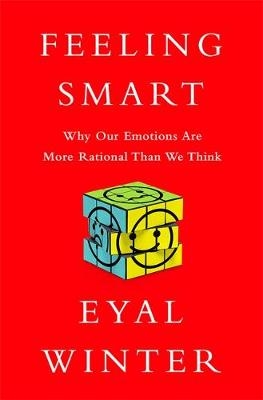
Feeling Smart
PublicAffairs,U.S. (Verlag)
978-1-61039-490-1 (ISBN)
Which is smarter,your head or your gut? It's a familiar refrain: you're getting too emotional. Try and think rationally. But is it always good advice?In this surprising book, Eyal Winter asks a simple question: why do we have emotions? If they lead to such bad decisions, why hasn't evolution long since made emotions irrelevant? The answer is that, even though they may not behave in a purely logical manner, our emotions frequently lead us to better, safer, more optimal outcomes.In fact, as Winter discovers, there is often logic in emotion, and emotion in logic. For instance, many mutually beneficial commitments,such as marriage, or being a member of a team,are only possible when underscored by emotion rather than deliberate thought. The difference between pleasurable music and bad noise is mathematically precise yet it is also something we feel at an instinctive level. And even though people are usually overconfident,how can we all be above average?,we often benefit from our arrogance. Feeling Smart brings together game theory, evolution, and behavioural science to produce a surprising and very persuasive defence of how we think, even when we don't.
Eyal Winter is professor of economics and director of the centre for the Study of Rationality at the Hebrew University of Jerusalem, one of the world's leading institutions in the academic study of decision making. He served as chairman of the economics department at Hebrew University and was the 2011 recipient of the Humboldt Prize, awarded by the government of the Federal Republic of Germany. He has lectured at over 130 universities in 26 countries around the world, including Harvard University, Stanford University, Princeton University, the University of California at Berkeley and the University of Cambridge.
CONTENTS Preface ix Introduction: What Is Rationality? xv PART I: ON ANGER AND COMMITMENT CHAPTER 1: What Is the Point of Getting Annoyed? Emotions as a Mechanism for Creating Commitments 3 CHAPTER 2: Why We Love Those Who Are Cruel to Us: Stockholm Syndrome and the Story of the Nazi Schoolteacher 12 CHAPTER 3: Emotional Impostors, Empathy, and Uncle Ezra's Poker Face 18 CHAPTER 4: Game Theory, Emotions, and the Golden Rule of Ethics 31 CHAPTER 5: The Prisoner's Dilemma in Repeated Interactions: Do Drawn Knives Increase Cooperation in the World? 38 CHAPTER 6: On Decency, Insult, and Revenge: Why Don't Suckers Suffer from Disgust? 51 PART II: ON TRUST AND GENEROSITY CHAPTER 7: On Stigmas and Games of Trust: Why Did the Bees Commit Suicide?, 61 CHAPTER 8: Self-Ful?lling Mistrust 69 CHAPTER 9: Cultural Differences, Palestinian Generosity, and Ruth's Mysterious Disappearance, 73 CHAPTER 10: Collective Emotions and Uncle Walter's Trauma 87 CHAPTER 11: The Handicap Principle, the Ten Commandments, and Other Mechanisms for Ensuring Collective Survival, 98 CHAPTER 12: Knowing How to Give, Knowing How to Receive: The Full Half of the Cholent, 110 PART III: ON LOVE AND SEXUALITY CHAPTER 13: The Spray That Will Give Us Love: On the Hormone that Creates Trust and Neutralizes Suspicion 117 CHAPTER 14: On Men, Women, and Evolution: Testing the Myths 121 CHAPTER 15: Make Me a Match Made in Heaven: Reproduction and the Mathematics of Romance 145 CHAPTER 16: From Cavemen Flutes to Bach Fugues: Why Did Evolution Create Art? 160 PART IV: ON OPTIMISM, PESSIMISM, AND GROUP BEHAVIOR CHAPTER 17: Why Are We So Negative? The Arithmetic of Emotions 167 CHAPTER 18: On Arrogance and Humility: The Norwegian Professor's Syndrome173 CHAPTER 19: Overcon?dence and Risk: The "It Can't Happen to Me" Syndrome 178 CHAPTER 20: The Voice Is Herd: On the Sources of Herd Behavior 189 CHAPTER 21: Team Spirit: The Paradox of the Generous Bonuses and the Lazy Workers 201 PART V: ON RATIONALITY, EMOTIONS, AND GENES CHAPTER 22: Irrational Emotions 219 CHAPTER 23: Nature or Nurture: What Is the Source of Rational Emotions? 228 Epilogue 233 Notes 239 Index 247
| Sprache | englisch |
|---|---|
| Maße | 165 x 236 mm |
| Gewicht | 486 g |
| Themenwelt | Geisteswissenschaften ► Psychologie ► Allgemeine Psychologie |
| Geisteswissenschaften ► Psychologie ► Verhaltenstherapie | |
| Naturwissenschaften ► Biologie ► Humanbiologie | |
| Naturwissenschaften ► Biologie ► Zoologie | |
| Wirtschaft ► Betriebswirtschaft / Management ► Allgemeines / Lexika | |
| Wirtschaft ► Betriebswirtschaft / Management ► Unternehmensführung / Management | |
| ISBN-10 | 1-61039-490-9 / 1610394909 |
| ISBN-13 | 978-1-61039-490-1 / 9781610394901 |
| Zustand | Neuware |
| Informationen gemäß Produktsicherheitsverordnung (GPSR) | |
| Haben Sie eine Frage zum Produkt? |
aus dem Bereich


